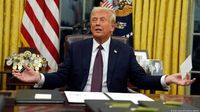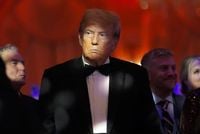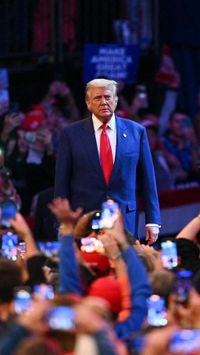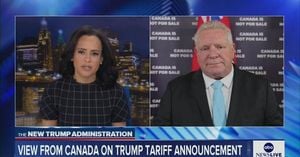In a political climate charged with uncertainty, former President Donald Trump has sparked debate about the possibility of a third term in the White House. Despite the clear restrictions imposed by the 22nd Amendment of the U.S. Constitution, which states, "No person shall be elected to the office of the President more than twice," Trump has not dismissed the idea entirely. In a recent interview with NBC News, he emphasized, "I’m not joking" when discussing the encouragement he has received from supporters to consider running again.
This controversial topic has ignited discussions among lawmakers, with some advocating for a reaffirmation of existing term limits while others propose changes to the Constitution itself. Representative Dan Goldman (D-N.Y.) has introduced a House resolution aimed at reaffirming the two-term limit, while Representative Andrew Ogles (R-Tenn.) has put forth a proposal to amend the Constitution to permit someone who has not served two consecutive terms to run for a third time.
The 22nd Amendment was drafted in the aftermath of Franklin D. Roosevelt’s unprecedented four-term presidency, which raised concerns about the potential for autocracy and the concentration of power in the executive branch. Roosevelt, who served from 1933 until his death in 1945, was the only president to serve more than two terms, a move that many at the time viewed as a necessary response to the challenges of World War II. Congress approved the 22nd Amendment in 1947, and it was ratified by the states by 1951, establishing a two-term limit that has since been upheld by all subsequent presidents.
Trump's recent comments have led to speculation about potential loopholes in the amendment. Some legal experts have pointed out that the amendment specifically prohibits a president from being "elected" more than twice but does not explicitly bar someone from serving a third term through other means. One theory suggests that Vice President JD Vance could run for president in 2028, with Trump as his running mate, and then resign after the election, allowing Trump to assume the presidency once again.
However, legal scholars largely dismiss these theories as impractical. Jamal Greene, a constitutional law expert at Columbia Law School, likened the idea of circumventing the 22nd Amendment to a “scrivener’s error,” asserting that constitutional law is not a game of semantics. Similarly, Michael Rosin, another constitutional scholar, noted that the amendment clearly prohibits Trump from being elected again, meaning he could not serve as vice president either.
Aziz Huq, a law professor at the University of Chicago, expressed concern about the implications of Trump's comments, arguing that the real danger lies not in his attempts to find loopholes but in the broader disregard for constitutional limits. Huq pointed out that recent actions by the Trump administration, including ignoring court orders related to the deportation of Venezuelans, highlight a troubling trend of dismissing legal constraints.
Trump’s musings about a potential third term are not entirely new. Throughout his political career, he has occasionally floated the idea, suggesting that he might explore options that would allow him to extend his time in office. In a statement made at the White House, he remarked, "People are asking me to run again," hinting at the support he believes he has among his base. He added, "I don’t know, I never looked into it. They do say there is a way you can do it," further fueling speculation about his intentions.
The historical context surrounding presidential term limits is significant. George Washington, the nation’s first president, set a precedent by voluntarily stepping down after two terms, emphasizing the importance of peaceful transitions of power. This unwritten rule was largely respected until Roosevelt challenged it in the 1940s, prompting Congress to formalize the two-term limit in the wake of his presidency.
While some critics argue that term limits can hinder voters’ ability to reward or punish leaders based on their performance, proponents contend that such limits are essential to prevent the concentration of power and potential tyranny. Countries like Kenya and Indonesia have also implemented similar two-term limits for their leaders, reflecting a global trend toward checks on executive power.
As the political landscape continues to evolve, Trump’s statements serve as a reminder of the ongoing debates surrounding the balance of power in American democracy. With the 2028 presidential election on the horizon, the implications of his comments could resonate far beyond the current political discourse.
In conclusion, while Trump may entertain the idea of a third term, the legal and constitutional barriers remain significant. The 22nd Amendment stands as a testament to the nation's commitment to democratic principles and the prevention of unchecked power. As the discourse unfolds, it will be crucial for lawmakers and citizens alike to engage in meaningful discussions about the future of American democracy and the importance of upholding constitutional limits.







